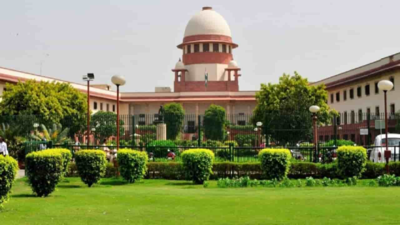
NEW DELHI: Bringing curtains over a 50-year-old dispute relating to Delhi Wakf Board’s claim over a Delhi gurdwara as waqf property, the Supreme Court on Wednesday said the Sikh religious place has been in existence since 1947 and rejected the Board’s claim that the property was ‘wakf by user’ since time immemorial.Appearing for the Board, senior advocate Sanjay Ghosh told a partial working day bench of Justices Sanjay Karol and Satish Chandra Sharma that the Delhi HC erred in reversing the concurrent findings of trial court and appellate court that it was a wakf by user. He said, “some kind of gurdwara was built over the mosque”.But the bench said the evidence shows that the gurdwara at Shahdara has been functioning at the suit property since 1947. “Not some kind of gurdwara was constructed as you claim. It is a functional gurudwara. This has been admitted by the witness produced by the Board before the trial court. You should voluntarily relinquish any claim over gurdwara.”The bench dismissed the appeal filed by the Board in 2011 against the Delhi HC’s Sep 24, 2010, judgment. Interestingly, the matter was taken up for hearing by the SC after a gap of 12 years, the last hearing in chamber being before Justice A K Sikri.The HC judgment by Justice Indermeet Kaur had discussed in detail what ‘wakf by user’ meant by relying on several judgments including one by a division bench of the Lahore HC in 1937 and those of the Supreme Court.The Lahore HC had ruled, “In the absence of any such intention or declaration, no wakf can be said to have been created. It is true that a wakf can be created by user, but that user too must be preceded by an intention on the part of the owner to create a wakf. If no such intention is established, user alone will not be sufficient to divest the property of its private character.” A stand which is similar to that of the Centre in defence of validity of the Wakf Amendment Act, 2025, before the Supreme Court.In the Shahdra gurudwara case, the HC had said the oral and documentary evidence establishes that the disputed property was a private property. “There is no evidence forthcoming to substantiate the Board’s claim that there was a permanent dedication of this property by the owner as waqf; there is not a whisper of this either in the pleadings or in the oral version of the witnesses (produced by the Board).”“A mere bald statement in the plaint that this property was being used since time immemorial as a wakf property was not sufficient to establish this plea… in fact there is a admission by a witness that the said property was used as a gurdwara since partition of the country,” the high court had said.














